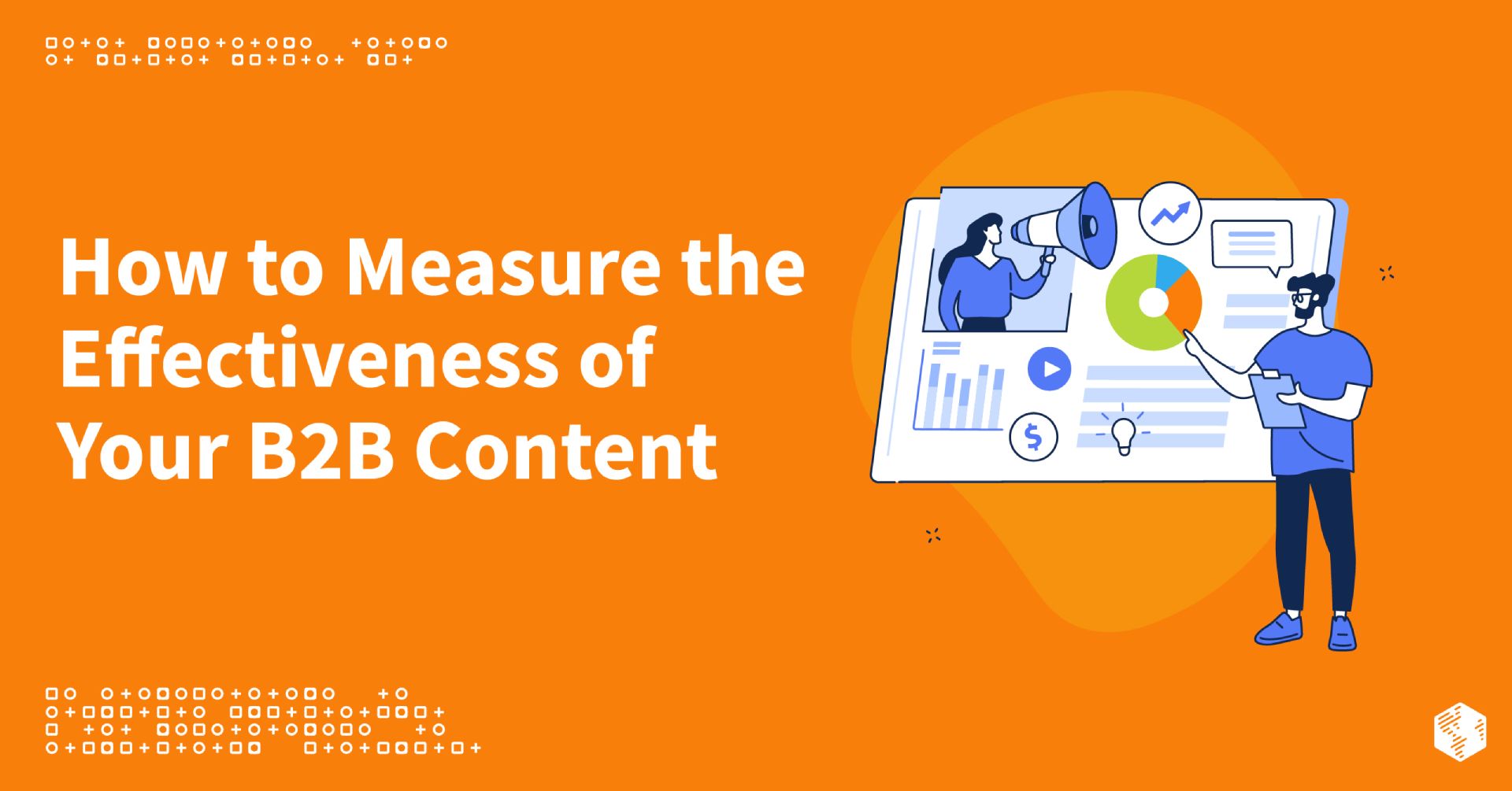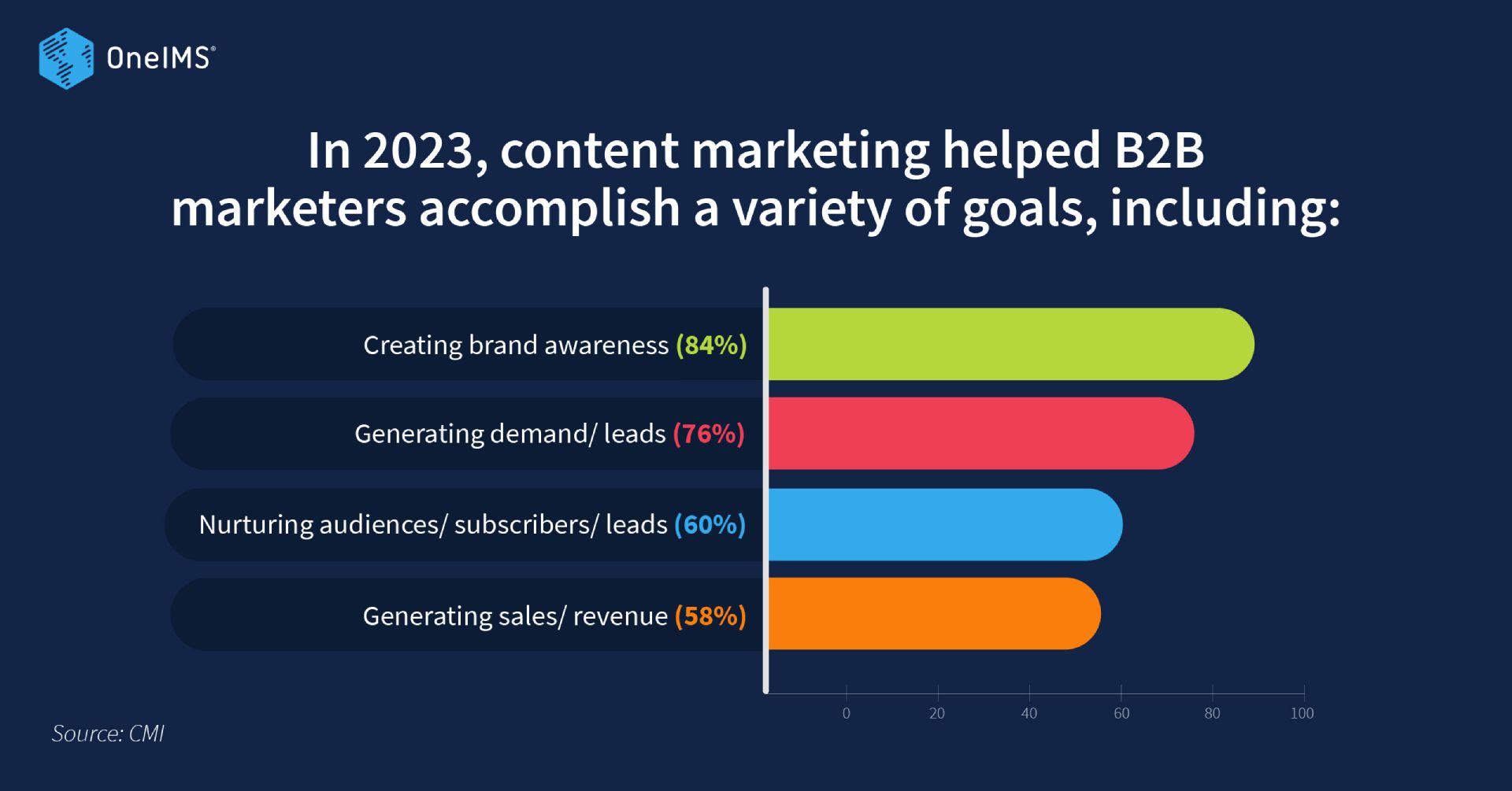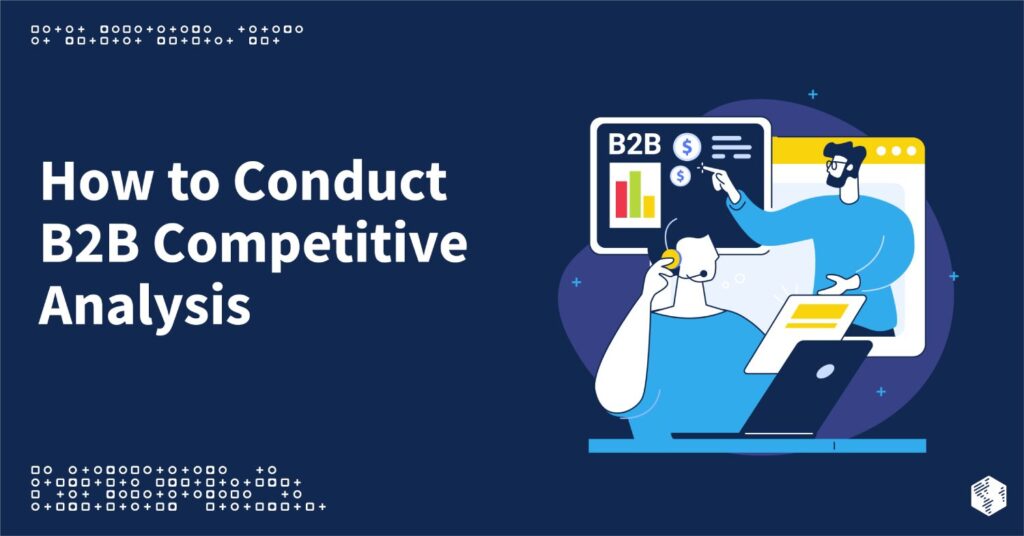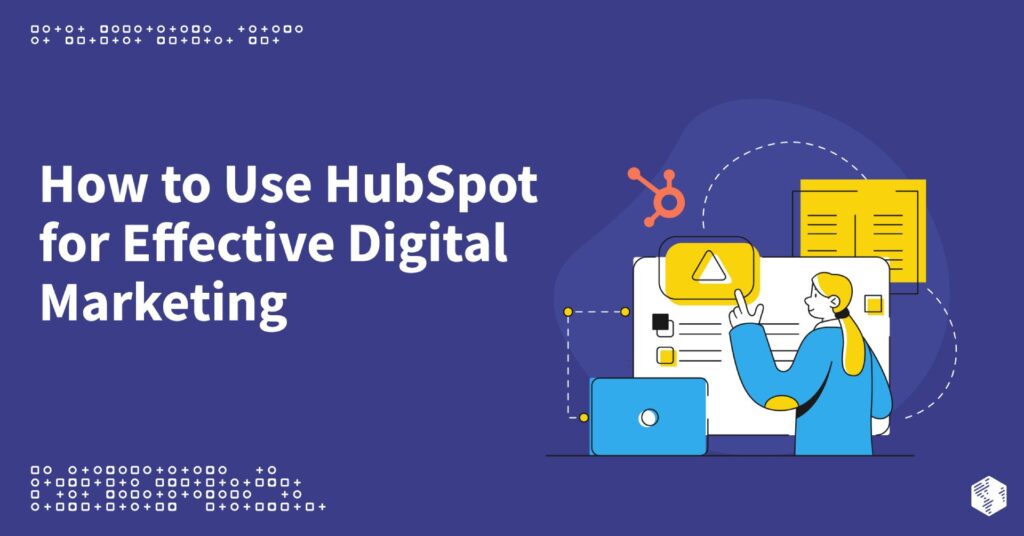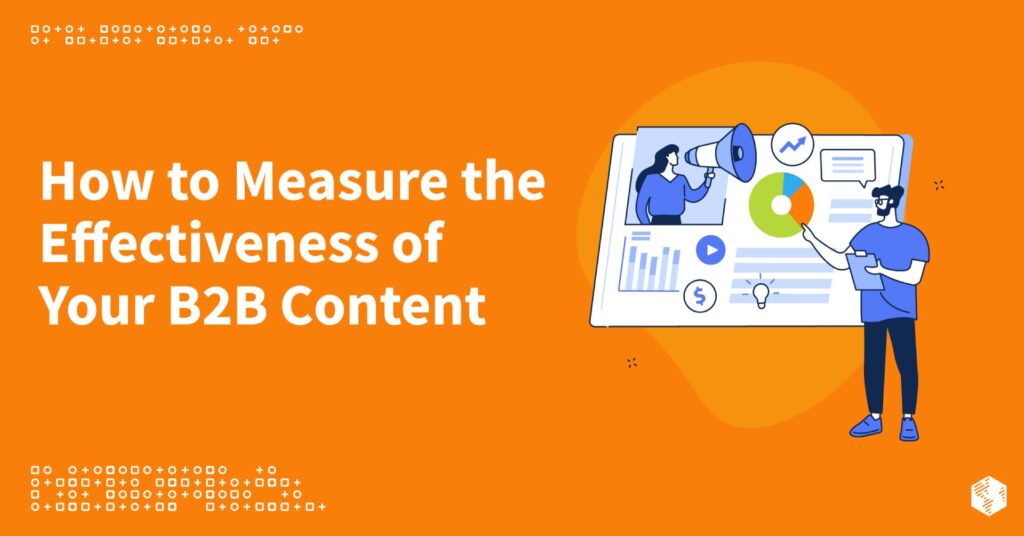Is your content pulling its weight?
Content marketing is no longer optional—at least, if your B2B company wants to stand out in the market, reach new audiences, generate leads, and achieve sustainable growth. But how do you know if your content is performing effectively? How can you tell if your social media campaigns, webinars, email newsletters, and podcasts are leading to positive results?
To ensure the effectiveness of your B2B content, you must carefully monitor, track, and analyze how it performs with your online audience.
Unfortunately, 36% of B2B marketers think their organization doesn’t measure content performance effectively. Stay ahead of the competition by measuring—and optimizing—the effectiveness of your B2B content.
Is Content Marketing Effective?
Survey says: yes.
The Content Marketing Institute surveyed content marketers around the globe and found that content marketing continues to be a powerfully effective B2B marketing strategy.
In 2023, content marketing helped B2B marketers accomplish a variety of goals, including
- Creating brand awareness (84%)
- Generating demand/leads (76%)
- Nurturing audiences/subscribers/leads (63%)
- Generating sales/revenue (58%)
That last number is important—because in 2022, only 42% of B2B marketers said content marketing helped generate sales/revenue. In other words, 16% more marketers found that content marketing leads to revenue and sales growth.
From these numbers, and from content success stories of our own, we know that content marketing remains an effective way of reaching, engaging with, and nurturing target audiences, even in today’s competitive B2B landscape.
What Makes B2B Content Successful?
What does successful B2B content look like?
While the specifics of content success can (and should!) be defined according to your B2B company’s unique goals, performance benchmarks, audience, and industry, there are some standards of excellence that all B2B content should meet.
Successful Content Is High-Quality
Effective B2B content is always high-quality—meaning it is well-written, error-free, and visually-appealing. By creating superior content, you can establish your B2B organization as a reputable, knowledgeable leader in your industry and build trust with your target buyers.
Successful Content Provides Value
B2B content must be valuable. Your content should truly benefit your audience by making their lives better and their jobs easier.
Successful Content Is Tailored to Your Audience
Great B2B content should speak directly to your audience, be tailored to their needs, address their pain points, and answer their questions. Of course, before you can tailor content to your audience, you have to know your audience inside and out—79% of B2B marketers agree that it’s the most popular success factor for content marketing.
Successful Content Is Distributed Effectively
Creating high-quality, personalized, valuable content is only part of the equation. Distributing that content is just as important to its success. An effective content distribution strategy could include email marketing, social media campaigns, video marketing, and more, but the most important aspect is that the platforms and channels used are aligned with the places your target audience spends the most time online.
Successful Content Drives Leads & Conversions
In B2B marketing, the true measure of content success is whether the content results in better leads and more conversions. (A viral social media post is exciting and extremely beneficial to brand awareness, but if it doesn’t result in more buyers down the line, it’s missing the mark.) Successful B2B content engages with prospects through every stage of the buyer’s journey and encourages them to convert.
Successful Content Is Continuously Improved & Optimized
“To improve is to change; to be perfect is to change often.” Winston Churchill may not have been talking about content performance, but the point remains: Continuously improving and optimizing B2B content is key to success.
How Do You Measure B2B Content Performance?
Measuring the performance of B2B content pieces, campaigns, and strategies involves tracking important metrics and performance benchmarks as well as analyzing the resulting data insights.
What Are KPIs in Content Strategy?
Key performance indicators (KPIs) are measurable values used to quantify and evaluate performance as well as progress toward established goals. Different marketing campaigns, channels, and formats have their own KPIs that B2B marketers use to track both performance and progress. For example, common email marketing KPIs include click-through rates, subscribe rates, and open rates. Alternatively, likes, shares, and comments are important social media KPIs.
How Do You Assess Content Performance? 10 Metrics & KPIs to Track
Understanding the impact of your content campaigns is paramount for refining your strategy and ensuring sustained success. Here, let’s shine a spotlight on the critical KPIS and metrics you need to effectively assess, measure, analyze, and optimize content performance.
1. Website Analytics
Use your website analytics to track the performance of individual pieces of content, assess user engagement, and identify the sources of your web traffic. Pay attention to metrics such as bounce times, page views, time on page, session duration, and conversion rates.
2. Social Media Metrics
Evaluate the performance of your content on social media platforms. Monitor engagement metrics including likes, shares, comments, followers, and click-through rates. Identify the types of content that resonate most with your audience on each platform.
3. Email Campaign Analytics
For targeted email campaigns, scrutinize key metrics such as open rates, click-through rates, unsubscribe rates, and conversion rates. A/B testing different email content can provide insights into what resonates best with your audience.
4. Conversion Tracking
Set up conversion tracking on landing pages, gated content, contact forms, and more to understand how your content contributes to lead generation and conversion efforts. Identify which pieces of content are most effective in moving prospects through the sales funnel.
5. SEO Performance
Assess your content’s impact on search engine rankings. Use search engine optimization (SEO) tools to monitor keyword performance, track organic search traffic, and evaluate the quality and quantity of backlinks to your content.
6. ROI Calculations
Calculate the return on investment (ROI) for your content marketing efforts. Compare the costs associated with content creation and distribution against the revenue generated or cost savings achieved. ROI helps quantify the value your content brings to your B2B organization’s bottom line.
7. Lead Generation Metrics
Evaluate the effectiveness of your content in generating leads. Track metrics such as the number of leads generated, conversion rates, and the quality of leads based on their interactions with your content.
8. Sales Conversion Rates
Measure the impact of your content on sales conversions. Analyze how content contributes to moving prospects from the consideration stage to the decision stage and, ultimately, the conversion stage of the buyer’s journey.
9. Brand Awareness Metrics
Assess the growth of brand awareness through content marketing. Track metrics such as brand mentions, social media followers, and overall brand visibility within your target audience.
10. Customer Retention Rates
Explore how your content contributes to customer retention. Analyze whether existing customers engage with your content and assess its impact on customer loyalty and satisfaction.
How to Measure Content Effectiveness: 5 Steps to Follow
Content marketing is an incredibly effective way to reach your target audience and engage with potential buyers, and successful B2B content results in more leads, more conversions, and more revenue. However, without an accurate process for measuring the effectiveness of content pieces and campaigns, it becomes challenging to determine whether content is achieving the desired results.
To ensure your B2B content initiatives are successful and evaluate the performance of your content, follow these steps.
1. Set Clear Goals & KPIs
SMART (specific, measurable, achievable, relevant, time-bound) goals are essential to B2B content success. Goals guide your content marketing team’s actions and ensure everyone is working together to achieve them. The challenge, then, is setting KPIs that align with your goals to ensure you are on the right track.
It’s easier said than done: The Content Marketing Institute found that goal setting (70%) and tying performance data to goals (76%) were significant hurdles for many B2B marketers when it comes to measuring content performance.
Fortunately, if your B2B organization has invested in a revenue operations (RevOps) framework, you will have a strong foundation for setting and achieving organizational goals.
2. Track Engagement & Metrics
According to the Content Marketing Institute survey, the most frequently used content performance metrics are conversions (73%), email engagement (71%), website traffic (71%), website engagement (69%), and social media analytics (65%). Tracking these metrics—and more—is the best way to learn how your audience interacts with your B2B content.
Leverage tools like Google Analytics to track website data and track social media activity and other metrics to measure content success.
3. Monitor Leads & Conversions
Leads and conversions—aka one of the core goals of B2B content marketing—are another important piece of the content performance puzzle. Monitor lead generation metrics and conversion rates to determine which content pieces and channels are the most successful, see what content brings in the most high-quality leads, and what campaigns attract the most attention from your audience.
4. Analyze Data Insights
Once you have access to metrics and KPIs, you can analyze the data, identify patterns, and draw insights that you can then use to improve and optimize B2B content. Marketing automation tools, customer relationship management (CRM) software, as well as your marketing operations (MarketingOps) team, are a valuable part of this process and can be leveraged to understand data and make informed decisions.
5. Get Feedback from Your Target Audience
An effective yet often overlooked way to measure the performance of your content is to ask your audience what they think about it. Share surveys, conduct interviews, hold focus groups, and request feedback from both loyal customers and prospective buyers to learn more about the relevance, perception, and value of your B2B content. Based on what you learn, you can then make improvements for future content campaigns.
Conclusion
Is your B2B content actually resulting in improved brand awareness, more leads, and additional revenue? More importantly, how can you tell whether your content is pulling its weight?
Measuring the effectiveness of your B2B content is essential for optimizing content performance, improving conversion rates, and driving growth. By tracking key metrics, analyzing data insights, and gathering audience feedback, you can create a benchmark for success, learn what’s working (and what isn’t), and ensure your content efforts yield positive results.
Need help improving your B2B content and implementing a content marketing strategy that attracts new buyers, retains existing customers, and leads to sustainable growth? We’ve got you covered. Schedule a consultation with us today to get started.




